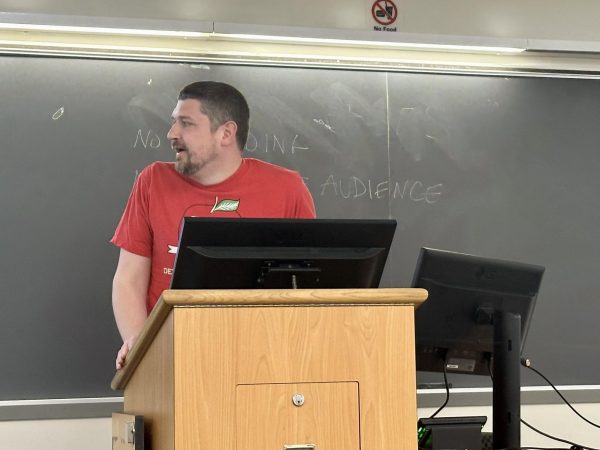Georgetown University students and history department faculty connected the current political landscape to historical events in a teach-in, a form of protest which draws on a tradition of informal education in leftist movements, March 28.
The teach-in featured seven 10-minute lectures on topics such as women’s history, international movements, right-wing campaigns and the Trump administration’s actions, followed by two small-group discussions on domestic and foreign policy. The organizers aimed to expose attendees to a diversity of viewpoints and inspire them to act in opposition to Trump administration policies.
Joel Berger (GRD ’25), a history doctoral student who co-organized the teach-in, said he designed the event to provide attendees with context to understand the current presidential administration.
“The more folks that were moved to act in whatever ways that might be is great,” Berger told The Hoya. “I hope it helped people conceptualize both the historical background of some of the things that we’re seeing and the global aspect of it.”
“I’m always looking for opportunities for making history relevant and particularly, given what’s happened at the beginning of this term — political crisis might be an understatement for describing what’s been going on since the beginning of the second Trump administration,” Berger added.
Katherine Benton-Cohen, director of graduate studies in the history department who also co-organized the teach-in, said she wanted to help people interpret current events themselves.

“I hope people are armed with a little historical context for the events and ideologies we talked about,” Benton-Cohen wrote to The Hoya. “In doing so, they can make informed decisions about how radical this administration is compared to past ones, and maybe share that information with others.”
The Trump administration has cracked down on student protests and academic programs recently, including requiring Columbia University to identify all student protestors and review its Middle Eastern, South Asian and African studies program. Federal immigration officials also detained Georgetown postdoctoral researcher Badar Khan Suri on March 17, alongside nearly a dozen students and faculty members nationwide.
Izzy Volpe (SFS ’28), who attended the teach-in, said she wanted to supplement her coursework with firsthand experience of collective action.
“From studying history, from studying literature, it’s very real and very life-threatening for a lot of people,” Volpe told The Hoya. “I wanted to be in a space where other people were acknowledging that reality and actually being in community to try to do something about it.”
“Feeling connected to past resistance movements is empowering and can make you feel less isolated in times where the problems can just feel so big that you feel like you can’t do anything about it,” Volpe added.
Berger, who worked as a public school teacher and labor organizer before beginning his studies at Georgetown, said the teach-in was an opportunity to build solidarity.
“I wondered, ‘How can we marshal our resources as historians to both speak to this moment, give people some context for this moment and gather people together?’” Berger said. “Especially being a former union organizer, I really believe that there’s power in just literally gathering together, grappling with this political crisis.”
The English department organized a similar teach-in Feb. 27, which Berger said inspired him to design his event.
“It’s an example of faculty taking it on to themselves to respond to this moment,” Berger said. “It’s organic, and the more of these that can happen, the better.”
Volpe said the teach-in helped foster dialogue but she hopes it translates into tangible action.
“As much as dialogue and discussion is so important and is in a lot of ways revolutionary, a lot of times it can become complacent or stop within that space,” Volpe said. “I hope people really listen to and absorb the information that they’re hearing and try to show up and resist in their everyday lives.”
Benton-Cohen said she hopes the teach-in inspires other departments and groups to create similar opportunities for community-based learning.
“I’d love for people to organize their own events and actions, including those that are more activist and political,” Benton-Cohen wrote. “We just wanted to create a space to offer intellectual context for those incipient movements.”
Berger said he hopes the history department’s efforts will inspire others to engage more actively with activism throughout the second Trump administration.
“I’m hoping it’ll cause a ripple effect, a cascade effect,” Berger said. “The more courageous people that get out there — especially folks that are privileged enough, that have full citizenship, that can afford to speak against this regime — the more people that get out there and resist, the better.”
“It’s better to do something and fail than to just sit back and talk about how bad everything is,” Berger added.








